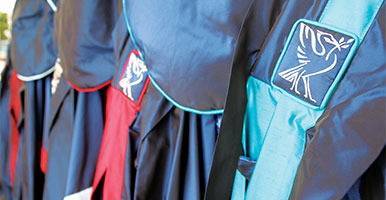Dr Scilla Dyke MBE
Presented by Kate Johnston
Honourable Pro-Chancellor, I have pleasure in presenting Dr Scilla Dyke for the award of an Honorary Fellowship from Liverpool John Moores University.
This is a truly civic university, firmly rooted in this extraordinary city, and its defining ethos comprises three deceptively simple yet very powerful words: dream, plan, achieve.
Each year at Graduation, the University's highest honour – an Honorary Fellowship – is bestowed on a select band of individuals outside the University, in recognition of their outstanding achievement in a given field or profession, and who personify and inspire others to 'dream, plan, and achieve.'
We propose Dr Dyke today on two counts. Firstly, in recognition of an outstanding and remarkable contribution to dance over 35 years, as a dancer, choreographer, teacher and campaigner for dancers' health and wellbeing; and secondly, for her many successes in introducing people from all walks of life, all abilities and all ages to the power of dance to transform lives.
Her own love of dance developed in early childhood, fostered by a life-defining opportunity at the age of 9, when she auditioned and was selected to perform for Dame Margot Fonteyn and Dame Ninette de Valois at the Royal Ballet. Family circumstances were such that there was absolutely no money for equipment or classes, so Scilla secured her first job while still at primary school – picking fruit to pay for the regulation clothing and satin dance shoes. 'Daring to dream' and a capacity for hard work have underpinned her career ever since.
Liverpool was very much at the centre of the known cultural universe for Britain's teenagers in the 1960s and 70s, and its influence drew Scilla north. Then, as now, IM Marsh was seen as a pioneer of combining the new and contemporary with the best of accepted practice. It offered a revolutionary holistic learning experience at that time, weaving innovations from the US, with teaching by practising artists and choreographers, and workshops delivered by renowned educators, dance artists, companies and athletes.
Scilla credits her training at IM Marsh as instilling an absolute understanding of her craft and the possibilities of what dance could be knowledge that has sustained her throughout a stellar, varied and sometimes challenging career. She graduated in 1977, when the economy was in the doldrums and the government of the day had been forced into an emergency loan from the International Monetary Fund.
Unemployment stood at 1.5 million, and was set to double within 5 years. It was a time of the most minimal provision but the most incredible opportunities. Establishing a portfolio, performing as a solo artist, teaching, dance and choreographic roles concurrently across full-time, freelance and voluntary contracts in both the UK and overseas in inner London schools, The Royal Ballet and the French government. She was one of the UK's Founder Dance Animateurs, now an established dancer-in-residence role that combines dance, teaching and choreography with creative and effective community outreach. For example, she devised and established Suffolk County Council's exemplary primary to postgraduate Dance in Education Programme, leading the Chief Education Officer to comment: "Inspired leadership…raising the profile in a way that not many could have believed possible".
As a Founder Director of DanceEast, she created a dance ecology in rural East Anglia that nurtured artistic talent such as Wayne McGregor, now one of the UK's leading contemporary dance choreographers; brought performances by world-class dance companies to the area; and facilitated access to dance for the widest possible cross-section of the region's community, from infants, politicians, pilots to prisoners at HMP Blundeston.
Many dancers will change direction at some stage in their career, sometimes as an active choice but, in other instances, it is enforced by physical limitation or injury. A serious car accident in 1990 was the catalyst for an enforced change of direction for Scilla.
Supported in her rehabilitation by the Arts Council, Scilla worked with the Foundation for Community Dance and was offered an opportunity to edit its Animated magazine. During her six-year tenure as editor, Scilla took the publication in new directions, incorporating more in-depth features about artistic practice, and exploring specific issues, such as how to practically support artists in the UK. She created The Dancer's Survival Guide, described as a "powerful and evocative tool for the development of critical thinking" by the Arts Council England.
Dancers as elite athletes must walk a fine line between the aesthetic demands of the choreography and physiological limits, if they are to keep healthy and free of injury. In collaboration with Dance UK, medical, legal and nutrition specialists, she researched and edited the seminal 2001 publication Your Body, Your Risk, which focused attention on the syndrome known as the Female Athlete Triad.
This is a potentially serious condition associated with females (and men) participating in sports and dance that emphasise leanness or low body weight which can have lifelong consequences for health. It took a further ten years for the research to be presented at the Royal Society of Medicine. Regardless of the reason, the end of any career, and especially a performing career after years of training, brings serious challenges. The process of transition involves a loss of identity, often likened to a bereavement and can be traumatic and stressful.
Dancers possess multiple intelligences and many transferable skills that are unique and valuable to society, which can be applied in other walks of life, but it is still common for a dancer to experience a crisis of confidence when their performing career ends. To date, Scilla has supported over 2,300 people through career transition, not only dancers, but also injured ex-service personnel, and has used skills learned throughout her dance career to broker and manage a wide range of innovative projects for government departments, and a wide range of organisations in the public and private sectors.
She currently specialises in career development, management and the scope and business of dance as a Senior Lecturer in Professional Studies at the Royal Academy of Dance. Her present role with the Royal Academy sees her connecting with colleagues across 79 countries through social media channels. "Never underestimate a dancer" she says.
We are at a tipping point, where society understands and recognises its value and this tipping point is clearly visible across many of those countries and cultures. Sue Harrison, Chair, Foundation for Community Dance for The British Council comments that Scilla "…has brought a vision – a belief that miracles do happen when dance and people meet, that dance does transform people's lives and that people are central to the process of making dance matter. She has done this with quiet determination, amazing modesty but she has made dance matter more."
She has served on a range of Boards, including the National Think Tank for the Year of the Artist, Arts Council East and as Chair of ArtLink. Currently she is a Committee member of the Lisa Ullmann Travelling Scholarship Fund, the Dancers Career Development and a Peer Reviewer for the Economic and Social Research Council.
Scilla was awarded an MBE for Services to Dance in 1999 and has an Honorary Doctorate and Honorary Fellowship from the University of East Anglia. She is an Honorary Life Member of the Foundation for Community Dance and a Fellow of the Royal Society for the encouragement of Arts, Manufactures and Commerce.
Thus, it is with great pleasure that I present Dr Scilla Dyke, this most distinguished adopted daughter of our city, for admission to our highest honour, as an Honorary Fellow of Liverpool John Moores University.



